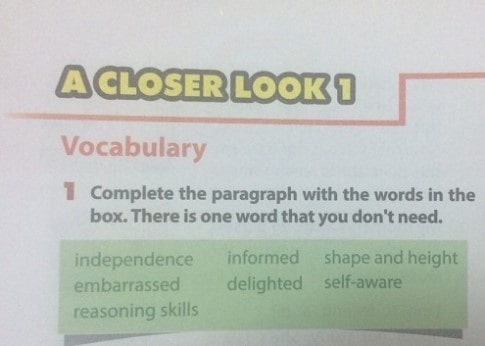

Trong bài viết dưới đây Trường kinh doanh công nghệ sẽ hướng dẫn bạn Soạn Anh 9 Unit 3 A Closer Look 1 chi tiết và đầy đủ. Mời bạn đọc cùng theo dõi nhé!

(Hoàn thành đoạn văn sau với những từ trong bảng. Một từ sẽ không cần sử dụng.)
| independence informed shape and height embarrassed delighted seft-aware reasoning skills |
Adolescence is the period between childhood and young adulthood. Your body will change in (1) _____ . Your brain will grow and you’ll have improved self-control and (2) _____. Physical changes are different for everyone, so you don’t need to feel (3) _____ or frustrated! You’ll experience emotional changes as well. You’ll feel you want more (4) _____ and responsibility. You may become more (5) _____ , and care about other people’s opinions, especially those of your friends. But remember you’ll need adult support and guidance to make (6) _____ decisions and overcome stress.
Lời giải chi tiết:
| 1. shape and height | 2. reasoning skills | 3. embarrassed |
| 4. independence | 5. self-aware | 6. informed |
Adolescence is the period between childhood and young adulthood. Your body will change in (1) shape and height. Your brain will grow and you’ll have improved self-control and (2) reasoning skills. Physical changes are different for everyone, so you don’t need to feel (3) embarrassed or frustrated! You’ll experience emotional changes as well. You’ll feel you want more (4) independence and responsibility. You may become more (5) self-aware, and care about other people’s opinions, especially those of your friends. But remember you’ll need adult support and guidance to make (6) informed decisions and overcome stress.

Tạm dịch:
Giai đoạn dậy thì là giai đoạn giữa tuổi thơ và tuổi trưởng thành. Cơ thể bạn sẽ thay đổi về hình dáng và chiều cao. Bộ não của bạn sẽ phát triển và bạn sẽ được cải thiện khả năng tự kiểm soát và kỹ năng phân tích nguyên nhân. Thay đổi về thể chất khác nhau đối với tất cả mọi người, do đó bạn không cần phải cảm thấy xấu hổ hoặc bực mình! Bạn cũng sẽ cảm thấy những thay đổi về cảm xúc. Bạn sẽ cảm thấy muốn độc lập và trách nhiệm hơn. Bạn có thể trở nên có ý thức tự giác hơn, và quan tâm đến những ý kiến của người khác, đặc biệt là những người bạn của bạn. Nhưng hãy nhớ rằng bạn cần sự hỗ trợ và hướng dẫn của người lớn để đưa ra các quyết định sáng suốt và vượt qua căng thẳng.
(Nối tên của các loại áp lực với những biểu hiện của nó.)
| 1. school pressures and frustrations 2. physical changes 3. unsafe living environment 4. problems with classmates at school 5. negative feelings about themselves 6. having too high expectations | A. I’ll never be good at maths. I’m just too stupid! B. ‘I hate my voice. It’s high one minute, low the next, then high again! What’s the matter with it? AND the girls are making fun of me! I’m so embarrassed. C. ‘I must get the highest score in this exam. I must be the best student in the class! D. ‘I feel worried when I have to wait for the bus in that neighbourhood after my evening class. It’s so quiet and dark there. E. ‘I have this big assignment to complete and I don’t know where to start. It’s too difficult! F. ‘Why does he make me do all of his homework? It’s not fair. And he says if I don’t do it, he’ll make my life difficult. |
Đáp án:
| A.5 | B.2 | C.6 | D.3 | E.1 | F.4 |
Hướng dẫn dịch:
A. “Tôi sẽ không bao giờ giỏi toán. Tôi quá là ngu ngốc!” – cảm xúc tiêu cực về bản thân
B. “Tôi ghét giọng của tôi. Nó trầm bổng không đều! Có chuyện gì xảy ra với nó vậy? Những cô gái lấy tôi làm trò đùa. Tôi thấy xấu hổ.” – sự thay đổi sinh lý
C. “Tôi phải đạt điểm cao trong kỳ thi này. Tôi phải trở thành học sinh giỏi nhất lớp!” – có kỳ vọng quá cao
D. “Tôi cảm thấy lo lắng khi tôi phải đợi xe buýt trong khu phố lân cận sau lớp học buổi tối của tôi. Ở đó yên tĩnh và tối”. – môi trường sống không an toàn
E. “Tôi có nhiệm vụ lớn để hoàn thành và tôi không biết bắt đầu từ đâu. Thật quá khó!” – áp lực học tập và sự thất vọng
(Điều nào sau đây nên làm với các tình trạng trên. Thảo luận với bạn của mình. (Mỗi tình trạng có thể có nhiều hơn 1 cách giải quyết.)
1. Take a break, then you will feel ready to start again.
(Hãy nghỉ ngơi, sau đó bạn sẽ cảm thấy sẵn sàng để bắt đầu lại.)
2. Break a large task into smaller tasks.
(Chia những nhiệm vụ lớn thành những nhiệm vụ nhỏ.)
3. Focus on your strong points.
(Tập trung vào điểm mạnh của bạn.)
4. Talk to someone about this and/ or ask them for help.
(Nói với ai đó về điều này và/ hoặc nhờ họ giúp đỡ.)
Lời giải chi tiết:
| A. 1;3;4 | B. 4 | C. 1 | D. 4 | E. 2;1 | F. 4 |
(Bạn đã bao giờ ở trong trường hợp đó chưa? Nếu có, bạn đã làm gì để giải quyết?)
Gợi ý:
Yes, I do. I experienced the first situation, which means I did think that I’m totally stupid because I was not good at Maths, I dealt with it by talking to my mom and my teacher. They helped me to improve my performance in Math and to be more confident.
Hướng dẫn dịch:
Rồi. Tôi đã trải qua tình huống đầu tiên, có nghĩa là tôi đã nghĩ rằng tôi hoàn toàn ngu ngốc vì tôi không giỏi Toán, tôi đã giải quyết nó bằng cách nói chuyện với mẹ và giáo viên của tôi. Chúng đã giúp tôi cải thiện thành tích môn Toán và tự tin hơn.
(Nghe đoạn băng và thực hành nói các câu. Tập trung vào cách các động từ được phát âm.)
Bài nghe:
1.
Where are you? You aren’t at the bus stop.
I am at the bus stop, but I can’t see you.
2.
Are you busy right now?
Yes, I am. Sorry, could you wait for a minute?
3.
Is Roniain?
No, she’s out ice-skating.
But it’s so cold!
It is. But she’s got all her warm clothes on.
4.
Wasn’t Bill disappointed about the exam result?
– He was. But he was hiding it well.
⇒ Some verbs are stressed while others are not. It depends on the what the speaker want to emphasize in the sentence.
Hướng dẫn dịch:
1.
Bạn đang ở đâu? Bạn không ở bến xe buýt.
Tôi đang ở trạm xe buýt, nhưng tôi không thể nhìn thấy bạn.
2.
Hiện tại bạn có bận không?
Đúng là tôi. Xin lỗi, bạn có thể đợi một phút không?
3.
Có phải Roniain không?
Không, cô ấy đang trượt băng.
Nhưng lạnh quá!
Nó là. Nhưng cô ấy đã mặc tất cả quần áo ấm.
4.
Bill có thất vọng về kết quả kỳ thi không?
Anh ấy đã. Nhưng anh ấy đã che giấu nó rất tốt.
⇒ Một số động từ được nhấn trọng âm trong khi những động từ khác thì không. Nó phụ thuộc vào những gì người nói muốn nhấn mạnh trong câu.
(Nhìn vào những câu sau và gạch chân những dạng của động từ “be” được phát âm. Nghe và kiểm tra lại.)
Bài nghe:
| Sentence | Stress |
| 1 | am |
| 2 | is |
| 3 | Isn’t |
| 4 | (none) |
| 5 | aren’t |
| 6 | is |
Chi tiết:
1.
You aren’t worried about the exam? Good for you!
I am worried! But I try not to show it.
2.
Do you think Jack is good at Japanese?
He is. But he’s a bit shy to speak it.
3.
Isn’t badminton her favourite sport?
Yes, it is.
4.
Who’s he?
5.
Sorry – we’re late!
Actually, you aren’t. We haven’t started yet.
6.
Is she happy at the new school?
Yes, she is. She likes it a lot.
Lời giải chi tiết:
1.
You aren’t worried about the exam? Good for you!
(Bạn không lo lắng cho kỳ thi sao? Chúc điều tốt lành đến với bạn!)
I am worried! But I try not to show it.
(Tôi đã rất lo lắng! Nhưng tôi cố gắng không thể hiện nó.)
2.
Do you think Jack is good at Japanese?
(Bạn có nghĩ Jack giỏi tiếng Nhật không?)
He is. But he’s a bit shy to speak it.
(Có. Nhưng anh ấy có một chút xấu hổ khi nói nó.)
3.
Isn’t badminton her favourite sport?
(Cầu lông không phải môn thể thao yêu thích của cô ấy sao?)
Yes, it is.
(Có, nó là môn thể thao yêu thích của cô ấy.)
4. Who’s he? (Anh ấy là ai?)
5.
Sorry – we’re late!
(Xin lỗi – Chúng tôi đến muộn!)
Actually, you aren’t. We haven’t started yet.
(Thật ra, bạn không muộn. Chúng tôi vẫn chưa bắt đầu.)
6.
Is she happy at the new school?
(Ở ngôi trường mới cô ấy vui phải không?)
Yes, she is. She likes it a lot.
(Vâng, đúng vậy. Cô ấy thích nó lắm.)
Như vậy bài viết trên Truongkinhdoanhcongnghe đã hướng dẫn bạn Soạn Anh 9 Unit 3 A Closer Look 1 chi tiết và đầy đủ. Chúc bạn học tập tốt!
Xem thêm: